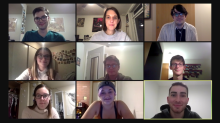In 1997, Professor Bryan Jones, director of the newly established Center for American Politics and Public Policy, and John Wilkerson needed some coding help. They also thought that undergraduates might be interested in using the data they were collecting to conduct their own research. The Center for American Politics and Public Policy (CAPPP) Undergraduate Fellows program was launched! Six undergraduates (including the President and Vice President of the ASUW) participated that first year, coding and working on their own research papers.
Although the CAPPP Fellows program has evolved over the past 23 years, close faculty mentoring continues to be its most prized feature. Students rarely work on faculty-led projects anymore. Instead, students typically spend the year designing their own research project, collecting and analyzing their own quantitative data, writing up their results, and presenting their findings at the Mary Gates Undergraduate Research Symposium.
These days, the faculty instructor takes the lead in guiding students toward original and important research questions, while a graduate student trains them in data collection, programming, and statistical analysis. Throughout the year, students consult with both mentors as students wrestle with data issues, try to make sense of their statistical findings, and write multiple drafts of their final papers. Everyone then practices their public speaking skills in preparation for the spring campus-wide research symposium.
This year’s CAPPP Fellows, mentored by Professor Becca Thorpe and Ph.D. candidate Bree Bang-Jensen, are studying a range of subjects. For example, one of two COVID-19 projects asks whether political elites’ tweets, statements, and policy proposals are helping to drive the public’s polarized response to the COVID-19 pandemic in the U.S. A second considers why some local foodbanks are more successful than others in mitigating food insecurity. Other projects examine whether the size, frequency, and quality of protests matter for policy, whether drone strikes inadvertently expand the scope of conflicts by fueling local insurgencies, and why some states are more likely to adopt laws that systematically weaken unions.
More than 125 students have now completed this year-long intensive program. Many found their calling and have gone on to pursue Ph.D.s and other graduate degrees. Others discovered that academic research is not for them. Regardless, nearly all of them describe the CAPPP Fellows program as one of the best, if not the best, experiences of their undergraduate education.
For more information about the CAPPP Fellows Program: https://depts.washington.edu/cappp/index.php/undergraduate-fellows/
